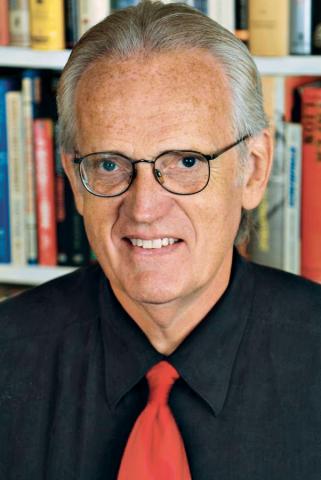Lester Munson, ’67: Applying a Legal Education to a Sportswriting Career
For 22 years after he graduated from the Law School, Lester Munson, ’67, gave lawyering a chance to win him over. He worked for a city firm; he did some legal work on the staff of an Illinois governor; he had a practice in the suburbs, becoming the president of his local bar association. But practicing law never did captivate him, and in 1989 he jumped ship, becoming a sports journalist whose work has shaped how America understands money, celebrity, violence, sex, drugs, race, gender, greed, falls from grace, court decisions, and government actions in the sports industry.
In a sense, that 1989 career shift reunited him with an earlier professional love. He had been the chairman of his Princeton college newspaper, enjoying it so much that after graduating he took a reporting job on the city desk of a Chicago newspaper.
That job choice was not entirely pleasing to Munson’s father, who was in the midst of what would become a 60-year legal career, most of it as a ferocious advocate for personal injury plaintiffs. “He cared about helping people who were at a real bad spot in their lives, almost to the point of being quixotic about it,” Munson has recalled. “He was very special, and watching him made me think that lawyers had to be special people—and I wasn’t sure I was one of those.”
After seeing a lot of lawyers in action on his reporting beat, Munson decided that he might be capable enough to be a lawyer, so he came to the Law School. Around that time, he met and fell deeply in love with Judith West, AB’63. They married and took a two-week honeymoon during the last quarter of his first year. “My grades at that time reflected that break,” he said, “and my subsequent grades reflected the fact that I was besottedly in love with my wife, a condition that never lessened.”
Recalling his time at the Law School, he mentions Francis Allen as the best classroom teacher he ever encountered, and says that what he learned about antitrust from Phil Neal was useful throughout his career, to Neal’s feigned dismay. “Judith and I became friends with Phil and his wife, Linda, and he would sometimes observe that at the same time as he was sharing considerable antitrust expertise with small classes of students, my passably informed writing about antitrust issues in sports was reaching millions,” Munson said.
The journalistic undertaking that redirected his career was the National Sports Daily, which began publication in 1990 as an attempt to create a new kind of sports publication with both local news and longer-form local and national stories. Munson heard about it because two of the leaders of the enterprise had been with him at the Princeton newspaper. “They staffed that paper with the most prominent names in sportswriting,” Munson recalled. “The only wild card was me.”
Profligately managed, the paper folded after 16 months, but Munson was soon recruited to join the staff of Sports Illustrated, where he remained for 13 years. In 2004, he joined ESPN, working there until leaving in 2020. He also appeared on television, in shows that ranged from sedate PBS discussions to the rambunctious Chicago-based “The Sportswriters,” whose hosts gathered around a poker table with cigar smoke filling the air.
Now, he continues with writing projects, and he is in his third year as the chair of the board of trustees of the national Hazelden Betty Ford Foundation. The death of his wife from cancer in 2020 was a hard blow for him. Along with support from friends, he particularly credits his two sons, their wives, and his four grandchildren for buoying him during that time and since. Son Lester III, AB’89, is a foreign policy expert who served as staff director of the US Senate Foreign Relations Committee; Max is an entrepreneur who has made a successful life in Prague. “I’d like to take some credit for the great kids I am blessed with, but who they are is much more a legacy of my wife,” he said. “For that matter, much the same could be said about me.”
